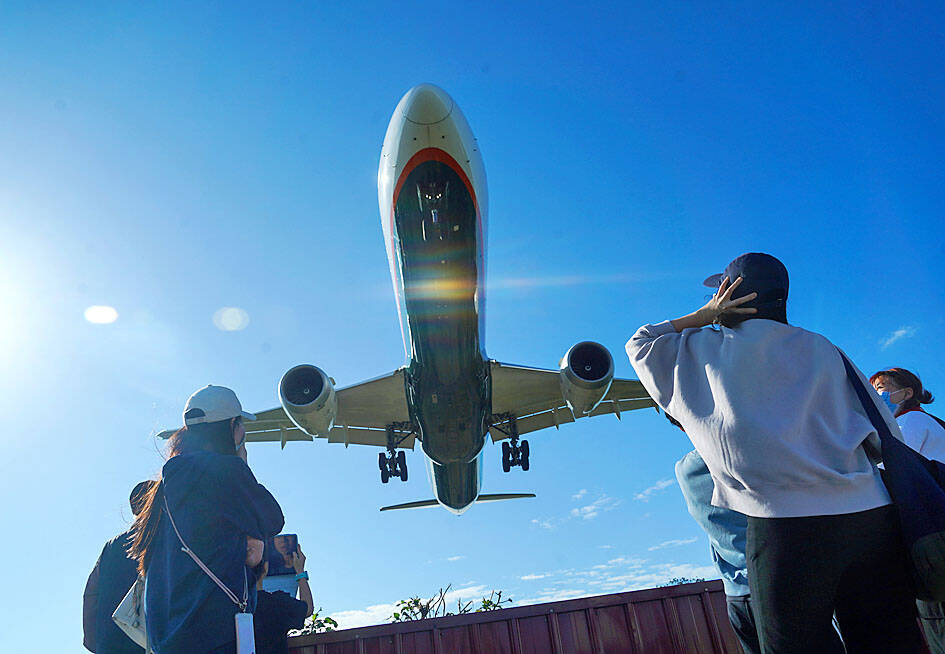Taiwan last year electrified 25 percent of public buses serving urban areas, a milestone on the path to Taiwan achieving net zero carbon emissions by 2050, the Ministry of Transportation and Communications said yesterday.
The push to make public buses electric was part of a NT$64.3 billion (US$1.96 billion) plan launched in 2023 to electrify buses, the ministry wrote in a report to the legislature’s Transportation Committee.
The project’s aim is to subsidize commercial bus operators to add 14,500 electric vehicles (EV) to their fleets to replace diesel-powered buses or as new purchases by 2030, it said.

Photo: CNA
As of November, the ministry has provided funding for 2,080 urban electric buses, of which 1,926 have been operationally certified, achieving last year’s target, the ministry said.
Officials installed 10,086 public charging points consisting of 7,681 slow-charging points and 2,405 fast-charging points to serve 92,166 private EVs, it said.
That means Taiwan reached the EU’s recommendation of 9.1 charging points for every privately owned EV, it said.
The nation has 23 fast-charging stations at 15 freeway service areas and one rest area, which have combined capacity to recharge 154 vehicles simultaneously, the ministry said.
A carbon footprint labeling program for enterprises in the logistics and transportation sectors that started last year provided eight classes and 21 conferences, it said.
A separate trial run with different training courses and guidance services for operators is to start this year and be expanded in the following years, it said.
Taiwan is planning to import sustainable aviation fuel for commercial airplanes and begin domestic production next year, the ministry said.
Sustainable fuel is derived from recycled biological materials.
The fuel later this year would be introduced to domestic airlines accessing Taipei International Airport (Songshan airport), Kaohsiung International Airport and Taiwan Taoyuan International Airport, the ministry said.
By 2030, sustainable fuels should comprise 5 percent of total domestic aviation fuel consumption, if all goes according to plan, it said.
The Ministry of Economic Affairs said in the report that it has established national standards to certify sustainable aviation fuel.
CPC Corp, Taiwan (台灣中油) is tasked with producing aviation-grade biofuel for long-term use, it said.
Taiwan should aim to substitute 10 percent of its aviation fuel consumption with biofuel, the National Science and Technology Council said.
Taoyuan airport consumes 3 million kiloliters of aviation fuel a year, it added.
Last year, the government cut emissions at airports by supplying power and air-conditioning to parked airplanes via air bridges, adding solar panels and supplying ground crew with EVs, it said.
Taoyuan airport replaced 35.7 percent of its ground support vehicles and installed 43 charging points for their use, the ministry said.
Taoyuan airport plans to increase the number of charging points to 70 by 2027, it said.

The US government has signed defense cooperation agreements with Japan and the Philippines to boost the deterrence capabilities of countries in the first island chain, a report by the National Security Bureau (NSB) showed. The main countries on the first island chain include the two nations and Taiwan. The bureau is to present the report at a meeting of the legislature’s Foreign Affairs and National Defense Committee tomorrow. The US military has deployed Typhon missile systems to Japan’s Yamaguchi Prefecture and Zambales province in the Philippines during their joint military exercises. It has also installed NMESIS anti-ship systems in Japan’s Okinawa

‘WIN-WIN’: The Philippines, and central and eastern European countries are important potential drone cooperation partners, Minister of Foreign Affairs Lin Chia-lung said Minister of Foreign Affairs Lin Chia-lung (林佳龍) in an interview published yesterday confirmed that there are joint ventures between Taiwan and Poland in the drone industry. Lin made the remark in an exclusive interview with the Chinese-language Liberty Times (the Taipei Times’ sister paper). The government-backed Taiwan Excellence Drone International Business Opportunities Alliance and the Polish Chamber of Unmanned Systems on Wednesday last week signed a memorandum of understanding in Poland to develop a “non-China” supply chain for drones and work together on key technologies. Asked if Taiwan prioritized Poland among central and eastern European countries in drone collaboration, Lin

BACK TO WORK? Prosecutors said they are considering filing an appeal, while the Hsinchu City Government said it has applied for Ann Kao’s reinstatement as mayor The High Court yesterday found suspended Hsinchu mayor Ann Kao (高虹安) not guilty of embezzling assistant fees, reducing her sentence to six months in prison commutable to a fine from seven years and four months. The verdict acquitted Kao of the corruption charge, but found her guilty of causing a public official to commit document forgery. The High Prosecutors’ Office said it is reviewing the ruling and considering whether to file an appeal. The Taipei District Court in July last year sentenced Kao to seven years and four months in prison, along with a four-year deprivation of civil rights, for contravening the Anti-Corruption

NO CONFIDENCE MOTION? The premier said that being toppled by the legislature for defending the Constitution would be a democratic badge of honor for him Premier Cho Jung-tai (卓榮泰) yesterday announced that the Cabinet would not countersign the amendments to the local revenue-sharing law passed by the Legislative Yuan last month. Cho said the decision not to countersign the amendments to the Act Governing the Allocation of Government Revenues and Expenditures (財政收支劃分法) was made in accordance with the Constitution. “The decision aims to safeguard our Constitution,” he said. The Constitution stipulates the president shall, in accordance with law, promulgate laws and issue mandates with the countersignature of the head of the Executive Yuan, or with the countersignatures of both the head of the Executive Yuan and ministers or